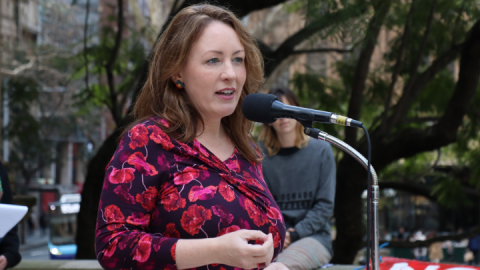“Taking Back Control”: Greens MLC Abigail Boyd on Nationalising the Energy Sector

Crises linked to our use of fossil fuels have become an everyday occurrence. If it’s not drought then it’s megafires or more recently, it’s the ongoing floods, and since the Morrison government dropped us in it, it’s the crisis in the energy sector.
The nation spoke out against the lack of climate action at the ballot box in May by voting against not only the last party holding office but both majors, which resulted in what’s been termed the greenslide as constituents turned to the Greens and teal independents.
But then came the crisis in energy in June, with the cost of electricity and gas soaring as the country entered a colder than usual winter, which was compounded by a number of other factors, including a coal sector that’s crumbling and the fact that gas companies prioritise overseas markets.
It’s against this backdrop that NSW Greens MLC Abigail Boyd is calling for the energy sector to be nationalised, meaning that we the public would own this essential service, allowing for the prioritisation of a transition to renewables and adequate affordable power for the community.
Just nationalise it
Nationalising energy, or transferring it from private to state ownership, seems like a bold move these days, which is rather strange as it wasn’t so long ago that the sector was in public hands.
Indeed, back in the early 1990s, state governments owned and controlled the entire power grids.
Under pressure from the Howard government in the mid-90s, state governments began selling off large chunks of public infrastructure, which included the deregulation of the energy sector and the privatisation of its parts.
Whilst full privatisation of the Victorian and South Australian energy sectors was achieved by the early 2000s, due to public resistance to the selloff in this state, the partial privatisation of the NSW market didn’t come about until 2015.
The Baird government sold off half of Ausgrid to superfunds in October 2016 for $16 million, whist its first foray into the privatisation of energy saw it sell off Transgrid to foreign investors for the tidy sum of $10.26 billion in November the year prior.
Take the power back
Of course, despite households feeling the pinch when it comes to power bills, the greater crisis is the climate emergency, and while the energy sector remains in the hands of private corporations focused only on profits, there remains great resistance to transitioning away from fossil fuels.
The other major concern around going green is that it’s done in a just manner that sees communities reliant on fossil fuel industries for employment being transferred to the new renewable energy sector, which is not something private companies can be trusted to facilitate.
Sydney Criminal Lawyers spoke to Greens MLC Abigail Boyd about the impact re-nationalising the energy sector would have upon the dual crises of climate and cost, why public ownership is a dirty word amongst certain sections of the community, and how public ownership will come about.
The federal election was marked by a mass turning away from the major parties, with a prominent issue being a lack of action on curbing fossil fuel use.
But in its wake the nation’s energy system has undergone a major crisis, which has been fuelled in part by the war in Ukraine, but to a greater extent the issue was caused by an ailing coal sector and corporations prioritising overseas markets in terms of gas supplies.
Abigail, how would you describe the state of the nation’s energy sector at present?
It’s a big mess. This latest crisis has shown us once again that you can’t simply put control of essential public services in private hands.
So, you’re commencing a campaign calling for the nation’s energy sector to be nationalised, as it once was. What would nationalisation look like?
What we’re going to see is the gradual shutting down of fossil fuel powered stations and replacing them with renewable energy sources.
If we want to make sure that this is done, not only as quickly as possible, but also as fairly as possible when it comes to looking after workers, coal communities and everybody else, the best way to do that is by taking back control of these companies and production facilities into public hands.
The idea is we have to right the wrongs of the past. We have to ensure that a huge chunk of the renewable energy sources is in public hands, at least as much as we require in order to keep the lights on in everybody’s home.
Then we need to be making the old power stations actually pay for the clean-up of their existing sites, which we know will be very expensive.
But in turn, the state can step in, assume those liabilities and buy those companies out for next to zero.
So, right now, there are these dual crises relating to the energy sector: the fact that it’s destroying life on Earth in its present form and rising energy costs. How would nationalising the sector impact these issues?
It’s important that we not just have control over the production and manufacturing side of things, but that we also have power over the retail side of things.
We know that despite this crisis, and despite people’s electricity bills skyrocketing, when you look at the likes of Origin, they’re still making megaprofits.
So, by removing the private intermediaries from energy retailing we can not only take control back in order to move to a decarbonised economy as quickly as possible, but also reduce people’s electricity bills by ensuring that we’re not allowing big companies to skim profits and pay shareholders.
Nationalising the energy system is a social democratic policy. These sorts of arrangements have been demonised in the public mind to some degree.
In your opinion, why do suggestions of putting certain industries under public ownership result in these kneejerk negative reactions from some in the community?
We’ve forgotten what it’s like to have essential services in public control.
We had the last 50 years of governments and various right-wing tabloids trying to convince people that the companies were going to come and save us.
It’s this sort of drive towards little government, with big industry as the way to go, privatise everything and apparently that was going to lead us to better services.
Now, when we look back at the actual raw data from the last at least 30 years, we can see very clearly that privatising these services has not resulted in a better outcome for people.
The only people who have benefited are the big corporations and their shareholders.
People have forgotten the option of having something that is actually public. We are here to remind them and given the current crises, people can see privatisation isn’t working, so perhaps we’ll get less of those kneejerk reactions.
We last spoke just after the Perrottet government rolled out extreme anti-protest laws aimed at stamping out unauthorised climate actions.
Last week, you again introduced a disallowance motion in an attempt to have some of these laws revoked.
These laws are part of a general trend in criminalising climate defenders as a means of protecting the fossil fuel industry. If this trend continues, what sort of outcomes do you consider it could lead to?
Unfortunately, when power gets uncomfortable, when those in charge get uncomfortable with being challenged, this is the eventual result where you get them silencing the people who are trying to complain and hassle them for different outcomes.
You’re right, that it’s the fossil fuel companies with their hands around the government’s throat making these sorts of draconian laws.
So, what we need are two things. They can’t silence everybody and the more of us that come together the stronger we can be, whether that be community groups, environmentalists or political parties, eventually the many can overcome the few.
But secondly, these laws that have been put in place, and are now being put in place in other parts of Australia as well, are going to be unconstitutional and will breach the implied right to freedom of political expression.
So, I’m hoping that helps to knock them on the head.
So, a High Court challenge is needed?
Yes, and I know there is one being prepared for the NSW laws, so hopefully that will come back with the right results.
And lastly, Abigail, the Greens have the nationalisation of the energy sector as part of its party platform. However, both major parties are notorious for not taking adequate climate action because they’re in the pocket of the industry.
Given this, how do you see the nation getting back to the point that it’s ready to re-nationalise the energy sector?
Change always takes time. It took time to convince people, or fool people, into thinking that these sorts of services shouldn’t be public, and it will take time to convince people that they should now be public.
But that is the role of the Greens, to put these ideas out there, to start the discussion and to remind people of what else is possible and then eventually those ideas filter into the consciousness of the other parties and their members.
We’ve seen that happen over and over, such as with marriage equality. So, I do think we need to be attacking this at all different levels.
One is by putting these ideas and robust policies out there that are different to what the other parties are offering.
But also, we really need to be working hard to tighten donation laws and laws preventing this revolving door between the major parties and the fossil fuel industry.
We need to be trying to get the fossil fuel industry out of our politics at the same time as convincing people that there’s a better way.








